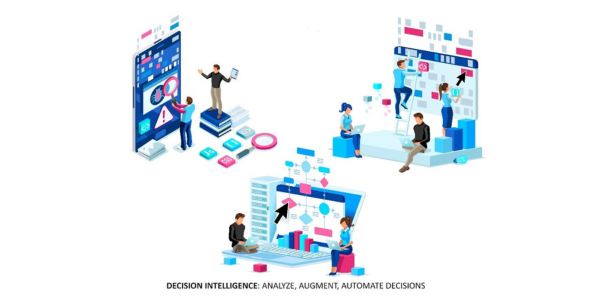Optimizing Outcomes with AI Powered Decisions: Webinar Q&A Part 1
Decision intelligence is about actions leading to outcomes. We highlight the key questions on decision intelligence and its impact on businesses.
What is decision intelligence? Harness its power to optimize business outcomes and learn how DI and AI can improve decision-making and lead to higher ROI.

With the rapid advancements in AI technologies, we see that every application, business process, and workflow will become more intelligent and automated in the coming years. Decision Intelligence (DI) will play a critical role in applying AI and infusing intelligence at critical decision points across all industries, and domains to unleash the business value, improve productivity, and make the businesses more agile.
Gartner included Decision Intelligence as one of the Top Strategic Technology Trends for 2022 and defines it as "Decision intelligence is a practical domain framing a wide range of decision-making techniques bringing multiple traditional and advanced disciplines together to design, model, align, execute, monitor and tune decision models and processes.
Those disciplines include decision management (including advanced nondeterministic techniques such as agent-based systems) and decision support and techniques like descriptive, diagnostics and predictive analytics.
Decision Intelligence encompasses:
Dr. Lorien Pratt, who coined the term Decision Intelligence and the co-author of the book "Decision Intelligence Handbook: Practical Steps for Evidence-Based Decisions in a Complex World", outlines five key processes that include Decision Requirements, Decision Modeling, Decision Reasoning, Decision Action, and Decision Review.
Over the last two decades, many companies have implemented various decision support and automation technologies, primarily Business Intelligence (BI), Business Rules Management (BRMS), and Robotic Process Automation (RPA). While each has tangible benefits, they fail to drive quality decisions and executable actions. Decision Intelligence offers a more dynamic, data-driven approach that adapts to complexity and change, providing enhanced decision-making capabilities in today's data-rich business environments. We will share high-level differences to contrast Decision Intelligence from the current approaches.
Business Intelligence (BI) primarily focuses on descriptive analytics, which involves summarizing historical data to provide insights into what happened in the past. Decision AInalyst, using AI-powered analytics, encompasses a broader range of analytics, including descriptive, predictive, and prescriptive analytics, enabling organizations to forecast future outcomes and recommend actions to optimize results.
BI is commonly used for generating regular operational reports, tracking key performance indicators (KPIs), and producing standard management dashboards. Decision AInalyst is suitable for cases requiring predictive capabilities, such as demand forecasting, fraud detection, recommendation systems, and natural language processing. Decision AInalyst is also used for prescriptive analytics, recommending specific actions to optimize outcomes.
Business Rules are specific, actionable directives used to guide business operations. They are explicit statements that define business behavior and decisions, often in an "if-then" format. Decision Intelligence is a broader concept encompassing data, analytics, machine learning, and decision theory to enhance decision-making processes. It's not just about setting rules but understanding and analyzing complex decision environments to make informed decisions.
Generally, business rules are simpler and more static. They are suitable for straightforward, repeatable decisions but might struggle with complex scenarios involving multiple variables and changing conditions. DI handles complexity better, integrating data from various sources and applying advanced analytics and machine learning to adapt to changing circumstances and complex decision scenarios.
Changes to rules require manual intervention, while DI is more dynamic and can learn and adapt over time using AI and machine learning techniques.
Decision Automation and Robotic Process Automation (RPA) are related concepts in the field of automation, but they serve different purposes and operate at different levels of an organization's processes. Decision automation focuses on automating complex decision-making processes, while RPA specializes in automating repetitive, rule-based tasks.
Decision Automation using Decision Intelligence can handle complex decision-making scenarios by analyzing data, considering multiple factors, and applying sophisticated AI and machine learning algorithms to enhance decision quality. While RPA can handle data, its primary focus is on data entry, retrieval, and transfer between systems.
Decision Automation and RPA can complement each other within an organization's automation strategy, with Decision Automation guiding processes as part of Intelligent Automation and RPA executing tasks efficiently.
Decision Intelligence delivers significant benefits to companies by improving the quality of decisions, increasing the efficiency and consistency of decision-making, and optimizing decision outcomes through continuous learning. While every aspect of business can be improved, here a few of the areas where DI have been proven to deliver an immediate and tangible ROI:
Compared to the existing decision support approaches, Decision Intelligence offers many advantages:
We want to share a few recommendations for getting started with DI to realize the benefits immediately:
Circuitry.ai stands at the forefront of this revolution, offering Enterprise AI as a Service applications tailored to specific industries and domains. By leveraging DI, Circuitry.ai helps businesses optimize the outcomes effectively and efficiently.
To harness the full potential of Decision Intelligence and transform your business decision-making processes, contact us today. Discover how our unique approach and tailored solutions can catapult your business into a new era of intelligent decision-making.
Decision intelligence is about actions leading to outcomes. We highlight the key questions on decision intelligence and its impact on businesses.
Learn how AI-powered Warranty Decision Intelligence can streamline home warranty operations, improve accuracy, and enhance customer service.
A practical guide to decision intelligence and its applications and best practices. Excerpts taken from the "Decision Intelligence Handbook".
Be the first to know about new decision intelligence insights to understand and engineer how AI-powered decisions are made and how outcomes are evaluated, managed, and improved.